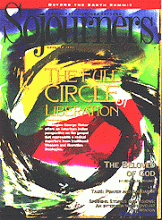On his newest release, Joshua Judges Ruth, singer/songwriter Lyle Lovett deals with death, relationships, and dinner (with side references to fly swatters and the dangers of peanut butter and jelly). While this might seem like an unusual range of subjects, it is emblematic of Lovett's style: lyrics about everyday life and music rooted in traditional forms brought together in distinctly original ways.
Lovett has been known as a country artist. He won a Male Country Vocal Grammy a couple of years ago and his previous albums were recorded in Nashville. This, his fourth album, was recorded in Los Angeles and marks an official switch to his label's pop division.
It's true that there's only one dyed-in-the-wool-pedal-steel-cry-in-your-beer song here, "She's Leaving Me Because She Wants To" (with country diva Emmylou Harris singing backup). But Lovett never was a standard-issue country artist; his work has blended blues, be-bop, folk, and country since his first album. Joshua Judges Ruth continues this eclectic mix, moving easily from rollicking gospel shouts to subtly nuanced ballads.
One of Lovett's lyrical hallmarks is a gift for painting scenes of life's little ironies and big tragedies (and vice versa) with a wry - some would say twisted - sense of humor. For example, "Church," an exuberant, surreal song about a preacher who won't stop preaching, layers gospel harmonies and piano with lyrics describing a congregation that gets so hungry that a rebellion starts in the choir loft and the spirit moves in odd ways.
LOVETT IS A MASTER OF the sly switch of phrase, especially when singing about the realm of love, sex, and romance. Songs such as "I've Been To Memphis" and "She Makes Me Feel Good" bop along with good-time keyboard and guitar licks and tongue-in-cheek lyrics. But Lovett also creates poignant ballads about relationships.
Read the Full Article

